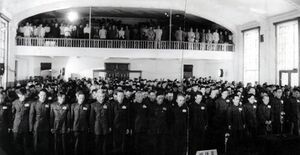Patlin trials
| Patlin trials | |
|---|---|
 Mass arraignment of the defendants in Lin Chow County Court on April 24, 1962 | |
| Court | Lin Chow County Court |
| Full case name | Republic of Nakong v Lim Chi-hou et al. |
| Decided | 12 June 1962 |
| Case history | |
| Appealed to | Court of Appeal of Nakong |
| Subsequent action(s) | Leave to appeal denied, 1962 NKCA 116 (Yip J., dissenting) |
| Court membership | |
| Judge(s) sitting | Mr Justice Howard Tan (presiding) Mr Justice Chan Mo-chiu Mr Justice Ian Waterford |
The Patlin trials were a series of trials that took place in Patlin, Nakong in which 46 university students accused of Shangean unionist activity were prosecuted and many were executed. The students had been rounded up in a crackdown following a pro-Shangean general strike that paralyzed the city of Patlin and later subjected to beatings and threats to coerce confessions from members of the group. As a result of these confessions, the entire group was prosecuted as members of a criminal enterprise and charged under colonial-era sedition laws for allegedly plotting to overthrow the Nakongese state on behalf of Shangea.
The subsequent trial, held before a three-judge panel of the Lin Chow County Court, was marked by numerous irregularities. Though guaranteed by Nakongese law, a jury trial was not offered to any of the defendants. The presiding judge, Mr Justice Howard Tan, openly castigated the defendants during the proceedings, and defence lawyers were prohibited from raising the issue of coerced confessions. Moreover, key prosecution evidence was not turned over to the defence ahead of the trial and numerous defence exhibits were not admitted into evidence seemingly without reason. Of the 46 defendants, 44 were found guilty by the trial court and sentenced to death, the mandatory sentence for sedition at the time.
A subsequent appeal to the Court of Appeal of Nakong was rejected in a two-paragraph summary disposition by six of the court's seven judges. The sentences of nine female defendants were commuted to life imprisonment, but the remaining 35 were put to death by hanging on 3 December 1962 in the largest mass execution in Nakongese history. The trial and executions inflamed tensions with Shangea and forced the Shangean unionist movement underground, resulting in the Unionist Crisis. The following year, the Parliament of Nakong enacted the Internal Security Act to criminalize all public expressions of support for unification with Shangea as treason. Justice Tan went on to be appointed to the Court of Appeal himself, serving from 1976 to 1988.
Since the end of the East Nakong insurgency and the dormancy of the unionist movement, demands to rectify the injustice of the Patlin trials have grown in Nakong. In 2017, Prime Minister Andrew Ng Fan-chiu admitted on behalf of the Nakongese government that the verdicts were "unsound", but stopped short of apologizing to the families of the victims.
Background
Arrest and trial
Sentences
Aftermath
In popular culture
- The 2023 film Lest Ye Be Judged, which is set to premiere at the 84th Montecara Film Festival, is a fictionalized account of the Patlin trials and its impact on the budding romance of two students who fall on opposite ends of the legal system.
